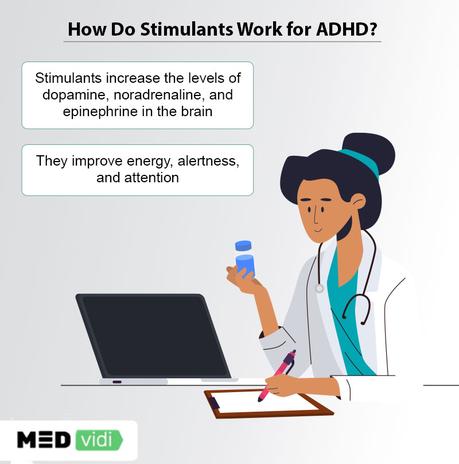How Do They Work?
- 13 January, 23
 ADHD
Stimulants for ADHD: How Do They Work?
ADHD
Stimulants for ADHD: How Do They Work?
The best way to treat ADHD is with a combination of treatment approaches. They may include medication, psychotherapy, dietary changes, and additional education on ADHD.
ADHD medications are used to complement other behavioral and lifestyle improvements. The most typical class of medication used to treat this disorder is stimulants. They function by enhancing the performance of a few specific chemicals available in the brain, which improves the efficiency of the brain’s neural circuits. Continue reading to find out how stimulants for ADHD work and what negative effects they may have.
What will work for you—stimulants or non-stimulants? Consult a mental health expert.
See A Doctor In 24 HoursWhat are Stimulants?
The stimulant class of drugs accelerates the transmission of signals between the brain and body. People may be more awakened, alert, energized, or confident when they use them. Stimulants come in various forms, including tablets, capsules, powders, small chunks of transparent crystals, and a white or brownish powder resembling crystals with a strong odor and harsh taste. They are typically taken orally, and the duration of their effects varies by type. Amphetamines, cocaine, nicotine, caffeine, and nicotine are all examples of substances in the stimulant category.
ADHD stimulants are prescribed medications. Stimulants used to treat ADHD were added to Schedule II in 2001 due to their higher risk of abuse and misuse. The DEA states that a substance has “a high potential for abuse, with usage potentially leading to serious psychological or physical dependence” if it is under Schedule II. When used improperly, these medicines are likewise regarded as dangerous.
Examples of ADHD Stimulant Medications
Below is the list of FDA-approved ADHD stimulants.
Drugs (Brand name)Active Ingredient
ConcertaMethylphenidate
FocalinMethylphenidate
RitalinMethylphenidate
AzstarysMethylphenidate
AdderallAmphetamine
VyvanseAmphetamine
DexedrineAmphetamine
MydayisAmphetamine
What Do Stimulants Do?
Stimulants mainly affect the level of catecholamines (dopamine, noradrenaline, epinephrine) in the brain, resulting in heightened alertness and focus, more energy, and improved well-being. Dopamine is linked with motivation, pleasure, focus, and better physical activity. Stimulant medicines help many ADHD sufferers concentrate and focus better while lowering hyperactive and impulsive behaviors. However, due to these drugs’ mechanism of action, the user can experience a crash or comedown when the effects of stimulants wear off.
Long-acting Stimulants vs. Short-acting Stimulants
Stimulant medications for ADHD come in both short-acting and long-acting forms. Short-acting stimulants require multiple daily doses and reach their peak effects quickly. Extended-release or long-acting stimulants typically only require a person to take one daily dose, and their effect lasts 8 to 12 hours.
As persons with ADHD sometimes struggle to remember to take their medications, the long-acting types of ADHD medication are therefore preferred by doctors. It is simpler and more practical to take one dose every day.
ADHD treatment is now just a click away. Click the button below to speak with an ADHD expert online!
Book An AppointmentHow Much Time Does a Stimulant Last in Your System?
The dosage you take and the drug’s strength as well as your metabolism, age, and general state of health are some variables that will affect how long a stimulant will stay in your system. For example, amphetamines, which comprise the majority of ADHD drugs, often have a half-life of fewer than 11 hours while methamphetamine has a longer half-life of about 12 hours. The ‘high effects’ of methamphetamines can persist for up to eight hours.
Side Effects of Stimulants for ADHD
ADHD medications sometimes cause mild to severe side effects. The most frequent negative consequences of stimulants could be:
- Reduction in appetite
- Loss of weight
- Headaches
- Anxiety
- Irritability
- Uneasy stomach
- Mood changes
- Depression
- Heart problems
- Dizziness
- Addiction
Contacting a mental health professional is the initial step to receiving ADHD treatment. Obtain your ADHD prescriptions from licensed physicians.
Get ADHD Medications Online
Stimulants Withdrawal
Like most medicines, stimulants can create withdrawal symptoms when used for a long time and stopped suddenly. The most typical withdrawal signs and symptoms are listed below:
- Anxiety
- Panic attacks
- Angry and moody behavior
- Seizures
- Extreme tiredness
- Increase appetite
- Insomnia
- Difficulty paying attention
Wrap Up
Even with all the information, it isn’t always simple to decide whether or not to take ADHD medication. Don’t make a snap choice if you’re on the fence about using stimulants for ADHD. Spend some time consulting a medical professional for the best decision-making process.

Real help for ADHD.
Beat your symptoms with our expert advice.





- ADHD help
- ADHD Impulsivity
- Adult ADHD medication
- Attention deficit hyperactivity disorder (ADHD)
- Best stimulant drugs
- Impulsivity Strategies
- Side effects of stimulants for ADHD
- Stimulants for ADHD
- What is ADHD
